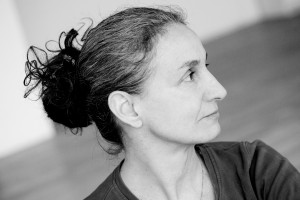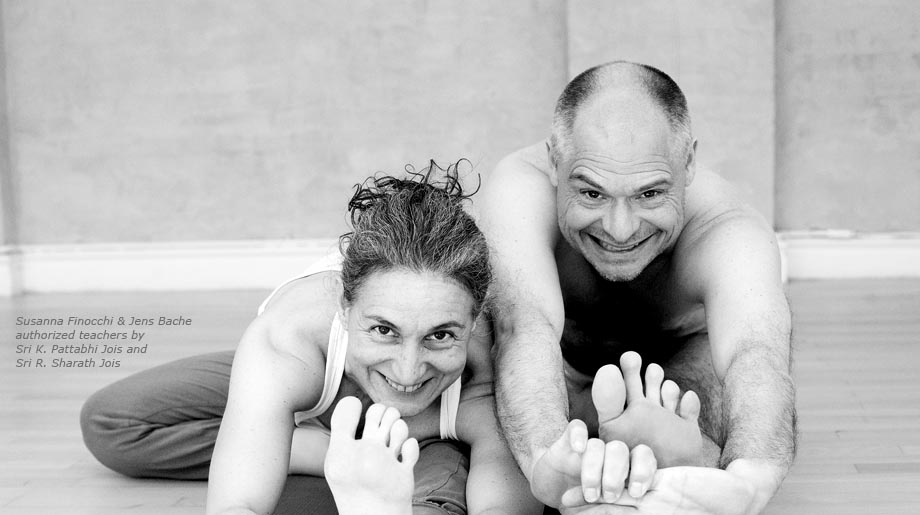During my trip to Mysore, India, in 2008, I was happy to meet Authorized Ashtanga teacher Susanna Finocchi who co-manages Ashtanga Yoga Copenhagen with her partner Jens Bache as they continued their studies at the Ashtanga Yoga Research Institute. I sat down to talk with Finocchi over breakfast at Santosha about her Ashtanga evolution. Here's an excerpt* of our conversation:
DC: Tell me a little bit of your path. You are an herbalist and were assisting your mom who is also an herbalist with whom you had a shop in Rome. Then you became an ashtangi, coming to Mysore every year…now you're an authorized teacher in the tradition of Sri K. Pattabhi Jois…
Susanna Finocchi: I just started yoga because I liked it. There was no other reason. I started out of curiosity because a friend said, 'try this yoga, you sweat….'
DC: When did you first come to India?
SF: I was here in Mysore completely as a beginner in '95, not even practicing 2 years and then again in '96. I was very surprised by the atmosphere of people. I was like 'Alice in Wonderland!' People were here staying abroad and far away from family for long periods of time.
DC: What do you love about teaching?
SF: To see people grow. It's like that story of a little duckling becoming a swan and then you can fly.
DC: And I imagine you've taught 100s of people by this time...
SF: Yes, in the school there are almost 50 Mysore students every day.
DC: When you are here in India, do you miss teaching?
SF: Now I start to feel the itch on the hands for teaching. But in the beginning it's very nice to just be a student and not have any responsibility, and to find time for myself and Jens, of course. To find time to just to think.
DC: Do you like doing a lot of [hands-on] adjustments?
SF: Yes, I like adjustments. Every time I come here, I adjust my ideas and my process and teaching approach. Sharath gives me very nice input. On this trip especially I had this thought to have the student try to catch the poses by themselves a little more. I like giving adjustments because I think it's effective but I think it's important also to give the student space.
DC: When students are struggling with that, do you make any recommendations? Do you think Ashtanga practice is a complete package to handle those strong feeling?
SF: There are many, many, many obstacles. I think it's a very personal journey. Somebody could be frustrated, somebody could find it easy, somebody can get sick or have pain and stop because they think yoga isn't supposed to bring this up. Or you can have someone who [does] not have an easy body [who meets] yoga much earlier than someone who has an easy body because they have to find another opening. If yoga is a self-realization path, then these things have to come up. I think there is a lot of justice in this practice.
DC: Justice?
SF: Justice in the sense that, sooner or later, everyone finds obstacles. Maybe you have such a flexible body and do unbelievable things but this doesn't mean anything.
DC: What do you think are the best supporting practices for the asana practice?
SF: Yama and niyama. It's about respect, love for other people, to care about other people, peace, none aggression, internal happiness, not this craving about another asana. And to be pure in our search.
*If you are interested in the full transcript of this interview, please write me at deborahrcrooks@gmail.com
DC: Tell me a little bit of your path. You are an herbalist and were assisting your mom who is also an herbalist with whom you had a shop in Rome. Then you became an ashtangi, coming to Mysore every year…now you're an authorized teacher in the tradition of Sri K. Pattabhi Jois…
Susanna Finocchi: I just started yoga because I liked it. There was no other reason. I started out of curiosity because a friend said, 'try this yoga, you sweat….'
DC: When did you first come to India?
SF: I was here in Mysore completely as a beginner in '95, not even practicing 2 years and then again in '96. I was very surprised by the atmosphere of people. I was like 'Alice in Wonderland!' People were here staying abroad and far away from family for long periods of time.
DC: What do you love about teaching?
SF: To see people grow. It's like that story of a little duckling becoming a swan and then you can fly.
DC: And I imagine you've taught 100s of people by this time...
SF: Yes, in the school there are almost 50 Mysore students every day.
DC: When you are here in India, do you miss teaching?
SF: Now I start to feel the itch on the hands for teaching. But in the beginning it's very nice to just be a student and not have any responsibility, and to find time for myself and Jens, of course. To find time to just to think.
DC: Do you like doing a lot of [hands-on] adjustments?
SF: Yes, I like adjustments. Every time I come here, I adjust my ideas and my process and teaching approach. Sharath gives me very nice input. On this trip especially I had this thought to have the student try to catch the poses by themselves a little more. I like giving adjustments because I think it's effective but I think it's important also to give the student space.
DC: When students are struggling with that, do you make any recommendations? Do you think Ashtanga practice is a complete package to handle those strong feeling?
SF: There are many, many, many obstacles. I think it's a very personal journey. Somebody could be frustrated, somebody could find it easy, somebody can get sick or have pain and stop because they think yoga isn't supposed to bring this up. Or you can have someone who [does] not have an easy body [who meets] yoga much earlier than someone who has an easy body because they have to find another opening. If yoga is a self-realization path, then these things have to come up. I think there is a lot of justice in this practice.
DC: Justice?
SF: Justice in the sense that, sooner or later, everyone finds obstacles. Maybe you have such a flexible body and do unbelievable things but this doesn't mean anything.
DC: What do you think are the best supporting practices for the asana practice?
SF: Yama and niyama. It's about respect, love for other people, to care about other people, peace, none aggression, internal happiness, not this craving about another asana. And to be pure in our search.
*If you are interested in the full transcript of this interview, please write me at deborahrcrooks@gmail.com


2 comments:
Very nice interview.
Susanna is such a great teacher. She is so patience and perseverance, and she is always there when you need here, day after day, year after year. If she is tired she never shows, if she is in pain (from always teaching) she never shows, she is what she is teaching, strong, steady, soft and happy. I will recommend everybody who gets a chance to visit her school and let her help you make the magic evolve.
I absolutely agree. I am also one of Susannas hundreds of students! And she has never failed to be incredibly nurturing and forthcoming. I always feel safe with Susanna to explore the obstacles she talks about here. Thank you so much, S, you are the best!
Post a Comment